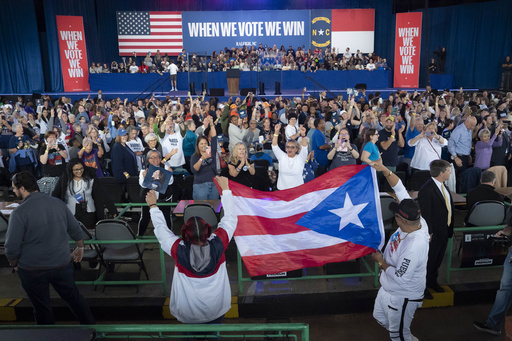
SAN JUAN, Puerto Rico — The elections taking place in Puerto Rico are set to be historic, regardless of whether Jenniffer González or Juan Dalmau emerges victorious in the gubernatorial race.
If González, representing the pro-statehood New Progressive Party, claims victory on Tuesday, it will be a milestone as it would mark the party’s achievement of three consecutive terms in power for the very first time in the island’s political history.
Conversely, if Dalmau, who is affiliated with the Puerto Rico Independence Party and the Citizen Victory Movement, wins, it will represent a significant shift, as he would be the first candidate from outside of the longstanding top two parties to win an election in Puerto Rico.
Trailing behind González and Dalmau in the polls is Jesús Manuel Ortiz from the Popular Democratic Party, which advocates for continued territorial status. Additionally, Javier Jiménez of Project Dignity, a conservative party established in 2019, is also a candidate in the mix.
For many years, the New Progressive Party and the Popular Democratic Party dominated Puerto Rican elections, collectively garnering over 90% of the votes. However, this trend began to shift in 2016, as emerging parties have gradually attracted a more diverse voter base amid ongoing economic and political challenges.
“This marks a significant transformation,” remarked Jorge Schmidt Nieto, a political analyst and university professor.
Delayed Vote Counting
As the election progresses, analysts are cautioning that results might not be available until a few days post-election. In the last electoral cycle of 2020, officials took four days to release initial results.
The State Elections Commission in Puerto Rico is currently working through over 220,000 early and absentee ballots that were submitted, with representatives from various political parties expressing concern over the slow pace of the tallying process. Notably, the counting of these ballots began over two weeks later than it typically would.
Jessika Padilla, the alternate president of the commission, stated during a press conference that approximately 40% of the early and absentee votes had been accounted for as of Monday.
“We are taking this validation process very seriously,” she emphasized.
Furthermore, out of around 7,400 inmates in the prison system, over 5,000 have exercised their right to vote, although the count of those specific ballots remains uncertain.
In addition to vote counting, the elections commission and various officials are addressing reports of electoral irregularities, including claims from individuals who received confirmations for early voting despite not having requested it.
To combat ongoing power outages that have afflicted Puerto Rico for years, energy generators were dispatched to over two dozen polling locations to ensure a reliable power supply during the voting process.
Political Status and Symbolic Voting
On the ballot, voters will also face a question regarding Puerto Rico’s political status for a seventh time. This nonbinding referendum presents three options: statehood, independence, and independence with free association, where issues such as foreign relations, U.S. citizenship, and the American dollar’s usage would be negotiated.
It’s important to note that any change in political status would ultimately require approval from the U.S. Congress.
Additionally, a symbolic vote allows Puerto Rican voters to show their support for Kamala Harris or Donald Trump, even though citizens on the island are unable to participate in the U.S. presidential elections.
Nearly 2 million voters are eligible to cast their ballots on Tuesday. However, voter engagement remains uncertain, as apathy towards participating in recent elections has become increasingly common.
